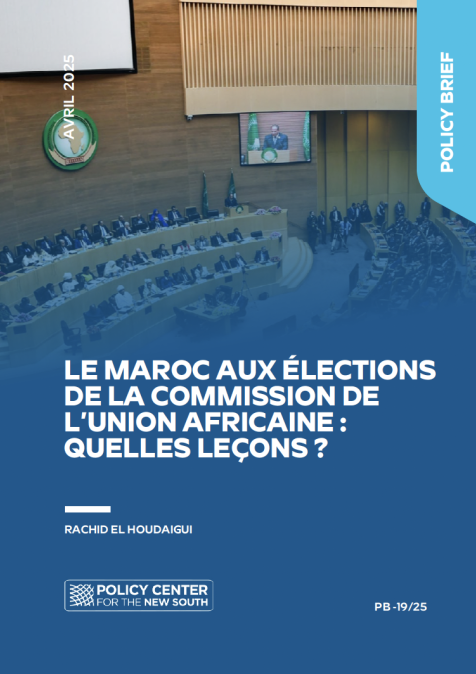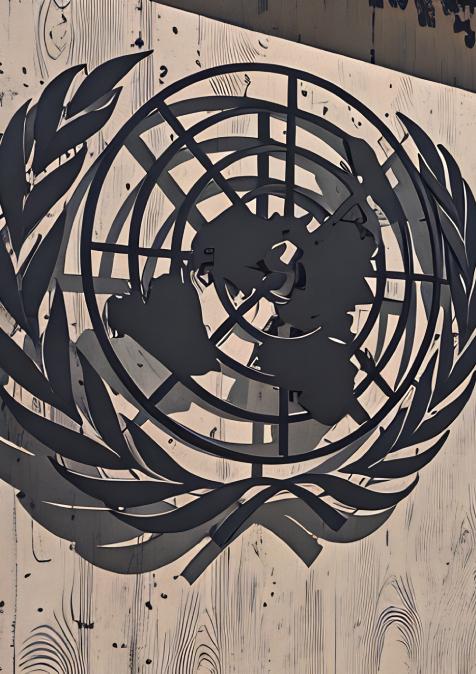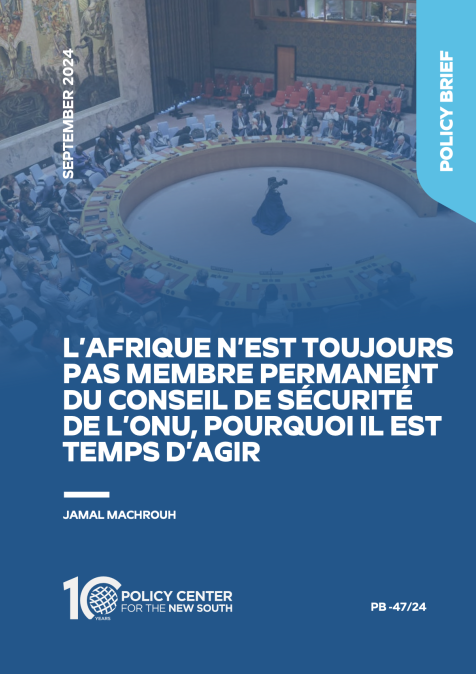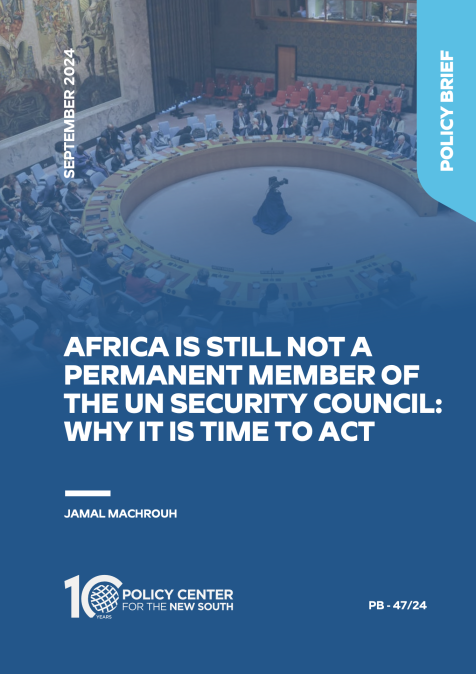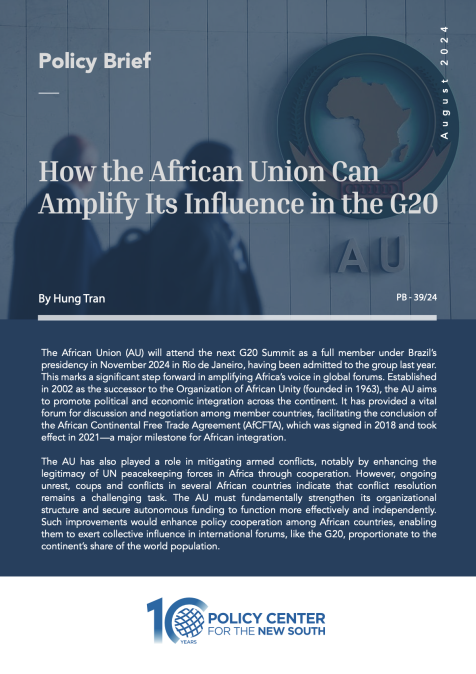Publications /
Policy Brief
The African National Congress (ANC), which has dominated the political scene in South Africa since 1994, began a downward trend in terms of votes won during the 2009 elections. However, this decline has never cast doubt on the ANC’s dominant position in the South African political landscape. Even at the lowest point in its popularity, during the “State Capture” scandal of 2019, a corruption scandal involving former President Jacob Zuma, the ANC won 57.5% of the vote, which largely allowed it to continue governing alone.
According to several analysts, this may not be the case after the May 2024 elections. The ANC is expected to receive less than 50% of the vote and may have to form a coalition with another political party. To what extent this hypothesis will be confirmed is the question that this paper attempts to answer.
“ANC’s [African National Congress] declining popularity continues a steady pattern observed since 2007 and is attributed to perceptions of growing systemic corruption within the party, ANC insularity from ordinary South Africans, and poor service delivery embodied by rolling electricity blackouts. South Africa also strains under the burden of growing inequality, poverty, and youth unemployment. Over 60 percent of 15- to 24-year-olds are unemployed, and many in South Africa’s sprawling townships struggle to find enough to eat. The ANC’s long dominance makes it hard to escape responsibility for these popular grievances.”
Joseph Siegle and Candace Cook “Africa’s 2024 Elections: Challenges and Opportunities to Regain Democratic Momentum.” Africa Center for Strategic Studies, January 17, 2024.
INTRODUCTION
The ANC is a dominant party. It is among those military-political structures that proliferated in Africa during the struggle for independence, and which subsequently capitalized on the legitimacy of the fight against the occupier to establish themselves as governing parties and dominate the political landscape in their respective countries. Other political parties emerged later, especially after the fall of the Berlin Wall and the campaign led by Westerners in Africa in favor of multi-partyism. However, these parties, whether born or created, have rarely been able to overthrow those who lay claim to the liberation nationalism to which the state owes its independence.
It should be noted, however, that without the capacity to become real political parties capable of delivering in terms of socio-economic development, individual freedoms, and fundamental rights, the liberation movements that were transformed into political parties are merely reiterating revolutionary slogans. They are out of step with the radical changes in international relations wrought by the end of the Cold War, as well as changes to socio- political structures brought about by technological advances, particularly in the field of communication. Parties such as these, which take refuge behind the nationalism of a bygone era, often lapse into dictatorship and corruption after a few years in power, thereby displaying a side that is at odds with the noble cause of resistance fighters struggling for independence.
It is to this category that the ANC belongs. The party has dominated political life in Nelson Mandela’s country, winning all the elections in the post-apartheid period. Each of these elections marked an important milestone in the history of South Africa and reflected the country’s challenges and political developments over the years. However, it is important to note that the ANC’s popularity has been in decline since the 2004 elections, leading to a popularity rate of less than 60% in 2019, as seen in the table below:
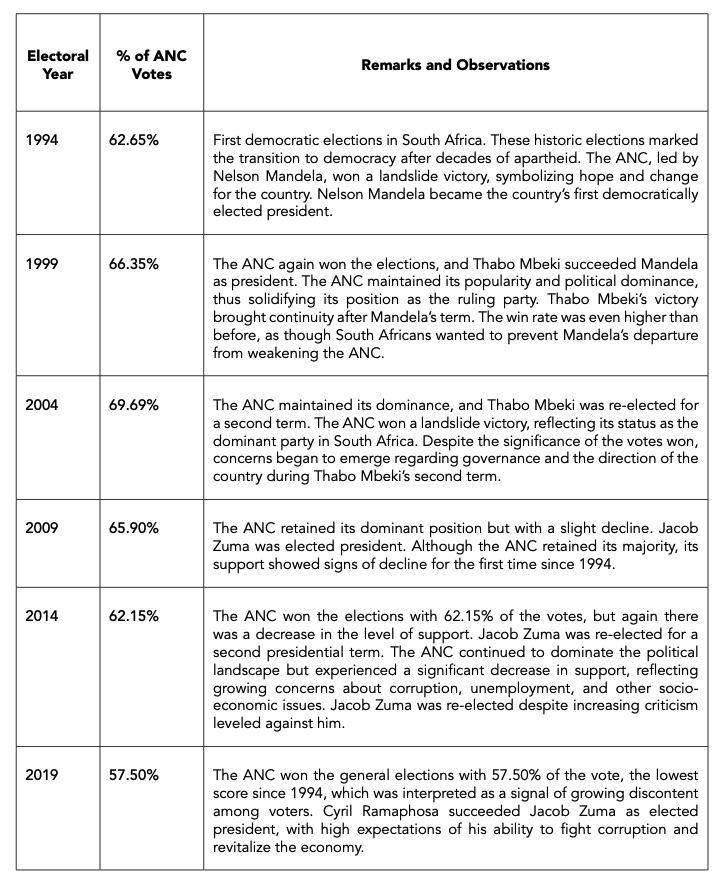
This table shows the ANC’s downward trend, which peaked at nearly 70% in 2004 and then fell below 60% in 2019, experiencing declines in both 2009 (65%) and 2014 (62%). This decline worries ANC leaders, with some predicting that they may lose in the May 2024 elections. The ANC may not lose its position as the leading political force, but according to several analyses, it may be unable to garner more than 50% of the votes and would thus lose its monopoly over the South African government. The party that has governed alone since 1994 may be forced to govern as part of a new political formation after the upcoming elections.
I. THE ANC WORN DOWN BY TIME AND CORRUPTION
1. The shining light of the liberation movement and its leader Nelson Mandela is no longer enough to keep the ANC in power
Among all the liberation organizations that proliferated in the context of apartheid, the ANC shined the brightest. The ANC was considered the leader of all South African liberation movements and logically could not be rivaled by another political structure in guiding the country through the post-apartheid era. Moreover, the ANC was associated with the image of Nelson Mandela, the hero of South African independence and the downfall of the apartheid regime, an association that made the ANC the party around which South Africa revolved. This image was reinforced during the two terms of Thabo Mbeki, who succeeded Nelson Mandela.
However, the enthusiasm of the early years seems to be waning over time, and we see its intensity fade as the early days of liberation recede. Increasing attention is focused on ANC’s inability to deliver solid economic, social, and political results.
Furthermore, the ANC has come under attack from its left wing, which deemed the party’ s policies towards the remnants of apartheid and its white elite very lenient. Advocates of this trend eventually split off to create the Economic Freedom Fighters (EFF), which continues to chip away at the ANC’s electorate, notably by advocating for social measures benefiting the black population.
The shrinking of the ANC’s electoral base can also be explained by generational change. Many young voters did not live through apartheid or the period immediately succeeding it. The criteria by which this category of voters evaluates a government does not rely on liberation movements; they judge state institutions based on their results in areas of health, employment, economic development, and on the probity with which public affairs are conducted.
The ANC’s militant past is no longer thought to provide much assistance in electoral matters, and South Africans are likely to further reduce their support for the party in the next electoral consultations.
2. An elite victim of the wear and tear of power and corruptive temptations
The ANC has been in power for 30 years. People have changed but the political structure governing the state has remained the same. This state of affairs has generated a certain monotony that hinders significantly any possibility of innovation, transformation, or alternative avenues for renewal. Moreover, the weakness of the opposition fostered an exaggerated confidence among ANC leaders in their domination over the South African political scene. The length of time they have been in power and the lack of change within the party have ultimately eroded the ANC and annihilated any desire for improvement within the party. It has become embroiled in personal and internal struggles, pitting members against each other in a power rivalry. With no external enemies, the ANC became caught up in internal strife. This trend reached its peak in 2018 with the infighting between Zuma and Ramaphosa.
Furthermore, ANC leaders felt a comfortable sense of impunity, given the extent to which the party is anchored in South Africa’s power structure. This sense of security, combined with the greed of certain members, fueled the corruptibility of its leaders and prompted some to overlook the boundaries between their personal interests and the interests of the state when it came to profit. As early as 2017, the collusion between Jacob Zuma and the Gupta brothers evolved into a scandal so spectacular that it became known as the “State Capture”, surpassing mere corruption to become a kind of handover of the state to individuals.
II. POLITICAL DISAFFECTION AND THE ETHNIC FACTOR: AGGRAVATING THE DECLINE OF THE ANC
1. The ethnic game could threaten the ANC with fragmentation or at least weaken its support base
When, in 1985, the former South African president Pieter Willem Botha announced that apartheid was an outdated concept, that the pass system was abolished, and that blacks were allowed to live in cities, he retained and strengthened the right of each community to preserve its identity. This was followed in 1986 by bloody clashes between the ANC, overwhelmed by out-of-control young Xhosa militants, and the Zulu movement Inkatha, led by Mangosuthu Buthelezi, Minister of KwaZulu, accused of solidarity with Afrikaners. The Zulus feared domination by the majority Xhosas within the ANC.1
In some circles, this rivalry between Zulus and Xhosas played in Jacob Zuma’s favor during the 2009 elections. Several ANC militants supported Zuma in counteracting the effects of an idea they believed was inspired by apartheid, whereby the ANC was an organization dominated by Xhosas. For this reason, they wanted to elect a president who did not speak Xhosa or even Zulu, such as Jacob Zuma. The election of the latter did end the dominance of the ANC by the Xhosas. The first two presidents, Mandela and Mbeki, belong to this ethnic group. The election of Ramaphosa, a member of the Venda community of the Shona group, and the entire campaign against Zuma in 2018 and 2019, were seen by the Zulus as an action against their ethnicity, and his incarceration in 2021 sparked deadly riots that claimed over 350 lives. These riots took place mainly in KwaZulu-Natal.
Former President Jacob Zuma’s affiliation with the new political formation uMkhontoweSizwe (MK) may revive ethnic rivalry. Zuma is increasingly trying to rally the Zulus and urge them to turn away from the ANC and vote for the MK. The latest polls, which give this new party 13% of the national vote, indicate that it would score 25% in KwaZulu-Natal. Moreover, the ANC, which initially ignored the new political formation, realized the danger posed by this new party after being rallied by Jacob Zuma, who could turn the Zulus against the ANC. Paddy Harper, a correspondent for the South African newspaper Mail & Guardian in KwaZulu-Natal, noted that “[w]hen Zuma was part of the ANC, KwaZulu-Natal became the largest and most influential province of the party. This helped the ANC to surpass the 50% mark in every national election since 2004”. The ANC fears that Zuma and the new party will deprive it of the Zulu vote and is doing everything it can to neutralize them.2 The ANC’s efforts do not seem to be bearing fruit; indeed, the judiciary has just overturned the decision of the electoral commission regarding the invalidation of Jacob Zuma’s candidacy under the MK banner. KwaZulu-Natal, where the ANC obtained its lowest vote share in the last municipal elections in 2021, may also harm the ANC in the upcoming general elections.
2. Political disaffection: a “red card” in 2024 after the “yellow cards” of 2014 and 2019?
In late 2023, the Independent Electoral Commission of 2024 expressed concern about the downward trend in voter turnout in elections held in recent years and the impact of this trend on upcoming general elections.3 Its Deputy Director, Masego Sheburi, warned of the expected decrease in voter turnout in the next election (2024), and considers this a major concern for the country’s authorities.
Indeed, while very high voter turnout rates marked the first two elections of the post- apartheid period, exceeding 85% and even nearing 90% in 1999, a simple analysis of electoral data from 2004 onwards is enough to discern the decline in voter turnout, which fell below the 70% mark in 2019.
It should be noted that this decline appears to be accompanied by a decline in ANC’s vote shares. The electoral decline of the ANC seems to go hand in hand with the decrease in voter turnout. The ANC appears to have two received two warnings; will it be given a “red card” in the upcoming elections? (See table below.)
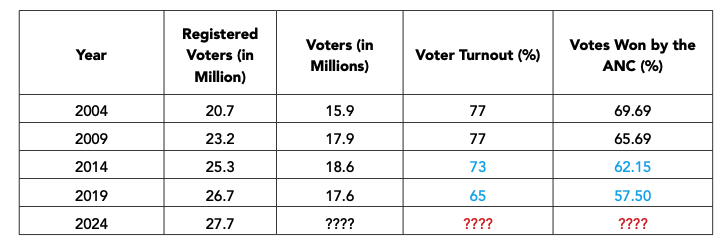
The table shows the almost turnout rates and the ANC’s perfect proportionality, in a downward trend, between voter performance, especially since 2009:
- In 2014, turnout fell below 75% and the ANC obtained only 62% of the votes cast;
- When voter turnout dropped to less than 70% in 2019, the ANC plummeted below 60% by obtaining 57.5% of the votes;
- Logically, if turnout is below 65% in the next election, the ANC would struggle to exceed the 50% threshold needed to continue governing alone and would be forced, for the first time in its history, to collaborate with another political party.
What prognosis can be made?
Based on the above, there is one undisputable fact and one question that needs answering.
- We know for sure that, following the May 2024 elections, the ANC will still be the largest South African political party in terms of audience and suffrage. It will certainly come out on top of the list after the elections, albeit with a score well below that of 2019.
- The question now is whether it will surpass the 50% threshold needed to form its own government or fall below this threshold, a result that would require it to collaborate with other political entities?
It is this line of questioning that reveals the complexity for analysts and observers in making a prognosis about the upcoming South African elections. All the ranges considered in previous elections placed the ANC, in both the best- and worst-case scenarios, in a position that allowed it to govern alone. Everyone was right as long as they did not imagine a score above 50%. Now, according to various analyses, the ANC’s margin ranges from 51 to 42%, with the possibility of continuing to reign over the government in Pretoria as well as the risk of plummeting to the point of needing an ally with whom to govern. A thousandth below or above is enough to put it in one position or the other.
Were we to venture a prognosis, based on the analysis presented in this paper, the factors determining the outcome of these elections seem, at present, to favor a resounding failure for the ANC rather than a miraculous rescue. It will certainly lose more votes than it did between 2014 and 2019. At best, the ANC will hover around 50% (just over 49%) of the votes, and at worst it will garner around 42%. In either case, it will lose the control it has had so far over the South African government. It would take a miracle (about 70% voter turnout) to place the ANC at slightly over 50%.
With whom will it govern? The answer to this question suggests another crisis that will affect not only the ANC but will cast uncertainty over the entire country. Will the Rainbow Nation become ungovernable?
--------------------------------------------------------------
1. Eric Nguyen, «Géopolitique de l’Afrique, connaissances essentielles, les grands enjeux », Studyrama, p, 71.
2. The ANC has filed a lawsuit before the electoral tribunal to cancel MK’s registration and prevent it from participating in the 2024 elections. It has also requested the High Court to prohibit this party from using the name MK, arguing that the ANC holds the copyright. MK is indeed the name of the late military branch of the ANC, launched by Nelson Mandela in 1961. This name, therefore, holds deep political symbolism and the ANC is determined to prevent Mr. Zuma, who joined the armed struggle of the ANC as a teenager, from claiming to be its heir.


